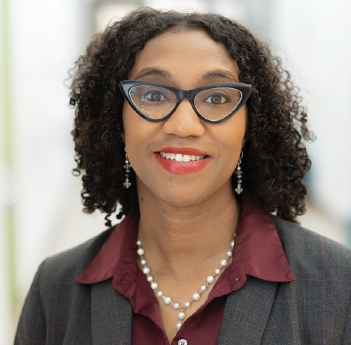A Conductor of Partnerships: Dr. Tom Nevill on Innovation and Apprenticeships at GateWay Community College
Located in the metropolis of Phoenix, Arizona, GateWay Community College is at the center of both growing industries and a growing population.


With academic and professional goals at the forefront of many college initiatives, it can sometimes be easy to lose sight of the individuals behind these important pursuits—students and faculty. However, the success and well-being of both faculty and students are inextricably linked. At Cape Cod Community College (4Cs), Dr. Carlnita P. Greene, Vice President of Academic Affairs, is leading the charge to embed this philosophy into every aspect of the institution. Her priorities, shaped by her own extensive experience in academia, revolve around creating a human-centric approach that emphasizes a supportive, flexible, and empathetic environment.
A thriving institution relies on a healthy and supported workforce, making faculty and staff development and well-being critical. “I think faculty and staff are key to higher educational institutions and it’s extremely important to make sure that we’re providing them with the support that they need professionally as well as personally,” Dr. Greene shares.
A significant part of this involves addressing mental health and wellness across the entire college community. Dr. Greene, working with the leadership team, is focusing on this holistically, “not just for our students but also across the college for faculty and staff.” Her approach is informed by her own journey as a faculty member, understanding the unique pressures and responsibilities educators face. “There are certainly a lot more opportunities, but also responsibilities, that faculty have in terms of serving students in ways that traditionally may not have been the case in the past,” she notes. Faculty members are no longer just teachers but also serve as mentors and advisors, building relationships with students and connecting them with resources.
Operating under the philosophy that “faculty success equals student success,” Dr. Greene believes strongly in building genuine relationships with faculty, both formally and informally. Part of this includes creating a culture where faculty can achieve a healthy work-life balance. She encourages others to think about a balance that involves both taking care of students and taking care of self.
She acknowledges the selfless nature often expected of educators but cautions against its potential pitfalls. “I think a lot of times we’re expected to be so selfless that sometimes you can just give all of yourself to particular individuals … without stopping to realize that if you are not taking care of yourself, if you are not setting boundaries and holding students accountable for things in the classroom, then sometimes that can lead to burnout.”
To combat this, Dr. Greene advocates for flexibility while also emphasizing accountability. She’s keen to hear directly from faculty about how to best support them, fostering a culture where self-care is encouraged, mental health is openly discussed, and taking time off is normalized.
Like many other institutions around the country, 4Cs is focused on ensuring that students have the academic offerings and flexibility they need to succeed. This includes “looking at ways to offer the courses that they specifically need for their academic majors and their personal and professional goals,” Dr. Greene states. Some considerations include evaluating student needs when determining course offerings and format. She emphasizes the importance of “offering our students flexibility and choice in terms of those courses that we offer, what times we offer, and what modalities we offer.”
This commitment to flexibility extends to alternative learning formats, like HyFlex courses. These courses allow students to attend in person or remotely via Zoom, offering a crucial lifeline for those balancing personal commitments. “If a student has child care issues, needs to take care of a parent, or for whatever reason may not be able to travel to the 4Cs, they can opt in to join class via zoom,” Dr. Greene explains.
A core tenet of Dr. Greene’s philosophy is ensuring 4Cs is a “student-ready college.” This means shifting the focus from expecting students to be prepared, to ensuring that the institution is prepared to support them, regardless of their background or circumstances. “Making sure that we as a college are ready for students and that we also approach them from a strength-based perspective,” she emphasizes.
This approach challenges outdated assumptions. Dr. Greene reflects on past attitudes when she was first a faculty member 20 years ago. She used to encounter faculty who said “‘Oh, the students just aren’t prepared,’ or ‘If they don’t have this skill, then I can’t teach them.’ I think the shift that’s happened over time is to think about how we can be better prepared for our students and support them where they are, instead of making assumptions about where we think they should be.”
She highlights the importance of empathy and providing resources to support needs outside of the classroom. If students are worried about paying rent or how they are going to eat, this can make it difficult to focus in the classroom. “When I taught, sometimes my students would just come and share things and I would go ‘Oh my gosh, all right. Let me connect you to this resource that we have at the college. Let me connect you to the food pantry. Let me connect you to mental health and counseling,’” Dr. Greene recalls. While faculty aren’t expected to solve every problem, they can be that connector and make a huge difference in students’ lives.
For first-generation students, like herself, navigating the “unwritten rules” of higher education can be daunting. Dr. Greene is committed to identifying and removing these structural barriers. This includes reviewing policies and procedures that might inadvertently create obstacles and bolstering advising services to ensure students understand how their courses align with their academic and career goals, preventing wasted time and money.
By prioritizing the human element, fostering a culture of support, and proactively addressing the multi-faceted needs of both faculty and students, Cape Cod Community College is committed to cultivating an environment that supports the whole person.